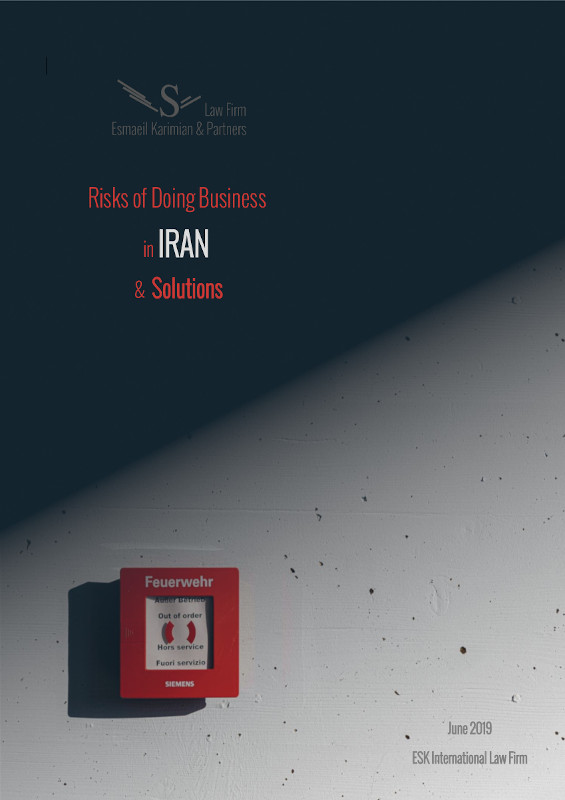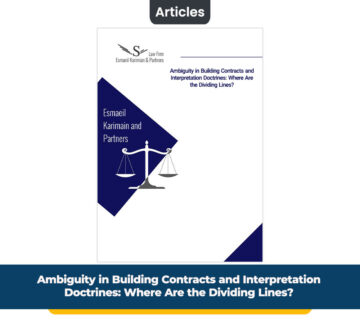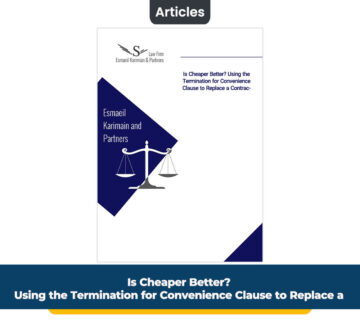In this article you will read:
1. Introduction
Expanding into the international market can be a great way for many companies to grow their profits while also accessing of new customers. However, the process isn’t without its challenges. Overseas activities come alongside all sorts of different international business risks, some of which can have a substantial impact on overall cash flow if not accounted for. By understanding the main risks and challenges, foreign companies can protect their cash flows, intellectual property and assets while running their businesses in Iran
In this Newsletter, some of common risks and difficulties of doing business in Iran will be briefed and their solutions will be explained.
2. Legal Complexity
It may have happened to you as it has happened to many others that you were confused when faced big challenges rooted in high density and critical variety of enactments. It does not make a difference whether these enactments are domestic or international, they will cause every investor serious problem if he/she has not taken the necessary measures. There are many rules and regulations in each industry of Iran and it makes it diffuclt for foreign investors to find their way and avoid legal challenges.
In recent years, developing countries including Iran have allocated substantial resources to make investment environment suitable and transparent, however, these measures are not enough and there are insecurities when it comes to compliance matters. Reading books and articles about Iranian legal system might be helpful in initial stages of investment, however, there are challenges in practice which requires legal advice from professional lawyers. So the best solution would be engaging a reliable lawyer to help you during investment process.
3. Volatile Foreign Currency Rate
Several different factors such as sanctions and inflation expectations of the Iranians led the Iranian currency market to experience severe fluctuations recently. The rial (IRR) has been volatile in recent years and has seen marked depreciation due to high inflation and international sanctions. The rate of depreciation is showing signs of slowing down, however. There are currently 3 foreign exchange rates used in Iran – a market rate, a Nima rate and an official rate, set and maintained by the Central Bank of Iran (CBI). CBI policy is trying to unify the exchange rates by allowing the official rate to depreciate gradually until it meets the market rate.
Foreign Investment Promotion and Protection Act (FIPPA) provides a solution for foreign investors to avoid volatile currency rate in Iran. According to this Act and its executive Regulation, after getting FIPPA License, foreign investors would be able to transfer their funds into Iran with a fixed rate and then repatriate their funds and its interest with the same rate. As a result, the currency conversion rate will be fixed for such investors and they will not affected by volatile currency rate in Iran.
4. Sanctions
On 8 May 2018, the President of the United States of America announced the withdrawal of the US from the Joint Comprehensive Plan of Action, otherwise known as the Iran Nuclear Deal. Although the leaders of the UK, France and Germany emphasized their continued commitment to the JCPOA, many companies ceased their activities in Iran and almost all foreign banks stropped working with Iran due to pressure of US on them.
Since breaching sanctions is illegal for many international companies, such businesses need to carefully determine what risks they might want to take on the less clear-cut issues of political or reputational risk, and ensure that they undertake appropriate and adequate levels of due diligence. If your company does not use US financial system and has no branch or activity in US, it would be possible to consider Iran’s market. Companies should consider seeking legal advice on whether they could be affected in the event of starting a business in Iran. Appointing nominee shareholders for your Iranian company or making partnership with a local company which has access to foreign banks are few solutions for avoiding sanctions in Iran.
5. Red Tape (Bureaucracy)
Iran is a highly centralised country and the government regulates many activities. Basic requests can require complex forms, administrative processes and stamps of approval and these can lead to delays. Due to the recent changes in “application of Information and Communication Technologies (ICTs) to government functions and procedures”, however, it is easier to predict the amount of resources required for getting licenses, permissions, and confirmations.
One can take the following steps in order to decrease the bureaucracy inevitable costs:
¢ Determining what exactly has to be done and synchronize them with the investment strategy
¢ Gathering necessary information about the certain license, permission or confirmation required
¢ Assigning one or more provision(s) dedicated to the certain license(s), permission(s) or confirmation(s) required in the investment agreement with the officials.
¢ Giving the task to the companies/individuals who are oriented with the official proceedings and requirements. They are already some registered companies/individuals who are willing to get the licenses, permissions, and confirmations needed for certain actions in exchange for a predetermined amount of money.
6. Transfer of Money
Unfortunately at the present time and due to the U.S sanctions on Iran, there are a lot of problems with using standard banking solutions in order to transfer money to and from Iran. However, in non-sanctioned industries, there is still a chance to benefit from the conventional banking solutions. Currently, Iran is using its banking connection with neighboring countries in order to import basic goods and materials to Iran.
Before the enforcement of the sanctions, a wide range of letter of credit and other guarantees were used in Iran for exporting or importing, but nowadays it has become more difficult to get these LCs. On the other hand, some Iranian banks have established their daughter companies in some countries that have good ties with Iran to facilitate doing business with Iran. Using private money exchange institutes could also be a solution to avoid sanctions and transfer of money into Iran.
Another way for transferring money to and from Iran is using “Cryptocurrencies”. Iran’s officials have been showing a paradoxical approach toward cryptocurrencies however, an investor could use this method while considering the risks.
7. Different language
Whether it is a contract or an ordinary dialogue with an official or employee, an investor will be in trouble if he/she does not know the local language. Fortunately, it is not a new problem and there are several solutions for different situations. For instance, some Iranian banks have provided their forms in English, there are several Iranian law firms including ESK who are willing to provide contracts, due diligence reports and other documents in English, there are many financial experts who can provide services in English, many Iranian governmental websites have different languages options and, some foreign embassies usually have special programs to help their investors.





No comment